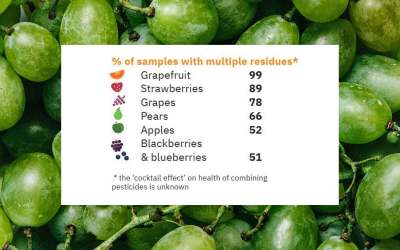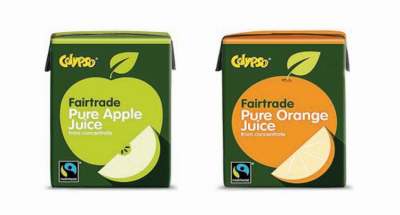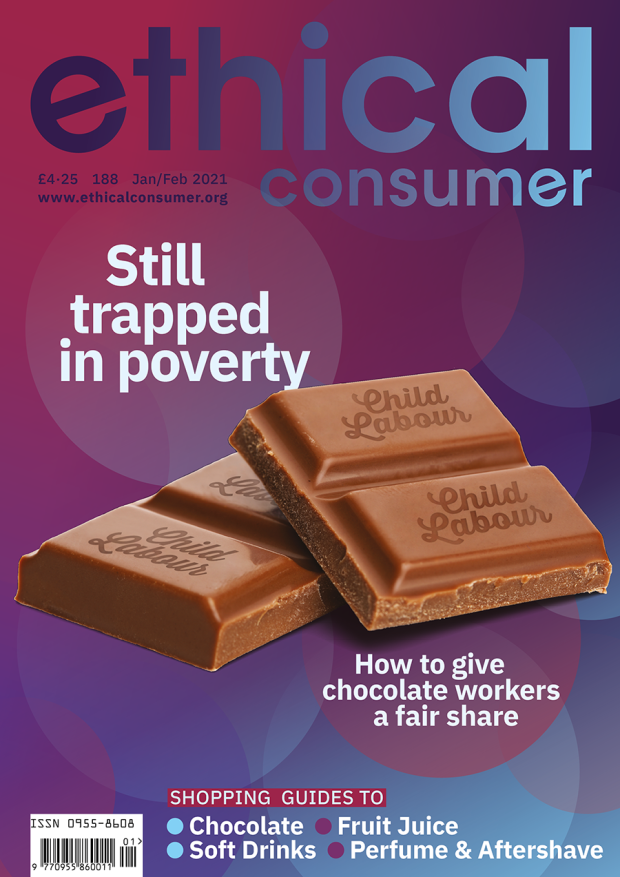This guide only covers 100% pure juice. Many of the companies in this guide also make vegetable juice and smoothies but we focus on the ethics of fruit juice here.
Juice drinks have sugars, sweeteners, preservatives, flavourings or colourings added to fruit juice. They are covered in the Soft Drinks guide. The market is dominated by the two big US soft drinks megaliths – PepsiCo and Coca-Cola – neither of which make a Fairtrade or organic variety.
Happily, there are some smaller, more ethical alternatives, although Fairtrade brands are thin on the ground.
What is fruit juice?
Fruit juice is usually described as:
- From concentrate – Juice is extracted from the fruit and the water content is reduced in the country of origin. The concentrated juice is usually frozen and shipped to the country of use for packing. Fruit juice packers then reconstitute the juice by adding back the water.
- Not from concentrate – Juice is extracted from the fruit in the country of origin and then lightly pasteurised and frozen or chilled and transported to the country where it will be packed.
- Freshly squeezed – Juice is extracted from the fruit and used immediately.‘Not from concentrate’ is often thought of being a better-quality juice than ‘from concentrate’ but there is no difference in them nutritionally, and they have both been pasteurised.
Chilled and freshly squeezed juices are more expensive, but although they may have the edge on flavour, nutritionally they are the same as long-life juices.
Fairtrade and organic fruit juice
Brazil is the world’s top exporter of orange juice, growing 60% of the world’s juice oranges. And orange juice is the bestselling juice in the UK (followed by apple, pineapple and grapefruit).
Oxfam published an investigation into conditions on tropical fruit farms in North East Brazil in October 2019. It found widespread and systemic poverty among seasonal workers, particularly women, on sites which supply supermarkets in Europe. Plus, the report also uncovered farms with poor working conditions and inadequate protection against exposure to pesticides.
These sorts of conditions are likely to be widespread in other countries growing tropical fruits like pineapples.
There aren't many Fairtrade fruit juices
Unfortunately, there are very few widely available Fairtrade certified juices – only Calypso (orange juice and apple juice) and Co-op (orange juice) are in this guide.
The company behind Fruit Hit, top of the table and the only Fairtrade Best Buy in our last guide in 2017, is unfortunately no longer in business. The company also owned the alternative Fairtrade cola brand Ubuntu too.
One option to safeguard workers’ rights may therefore be to avoid tropical juices but then again, as economist Joan Robinson argued:
“the only thing worse than being exploited by global capital is not being exploited by global capital”
Organic fruit juice
Choosing organic is another option which protects the environment, the growers who have to apply the pesticides and the consumer who may consume them.
There are more of these in the shops – Luscombe (all juice is organic), Biona (all juice is organic), Pip Organic (all juice is organic), James White, Suma, Rocks, Waitrose Duchy Organic, Sainsbury’s SO Organic, and Tesco.
If you can’t always buy organic, a recent survey by Pesticides Action Network of the pesticide residues on fruit and veg sold in the UK helps you prioritise. Here are the stats for fruits commonly used in juices:





